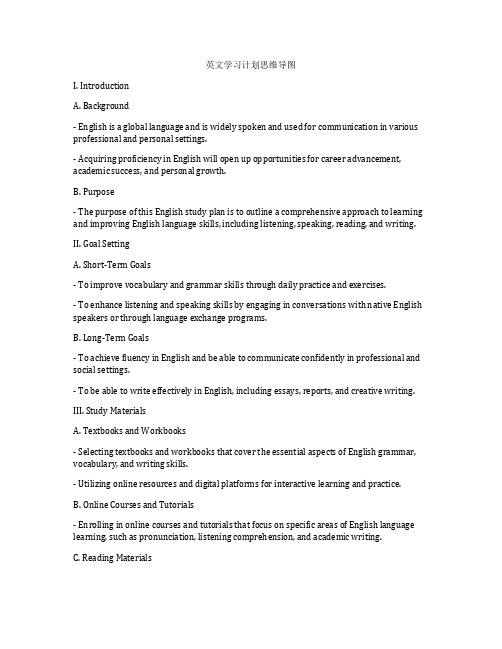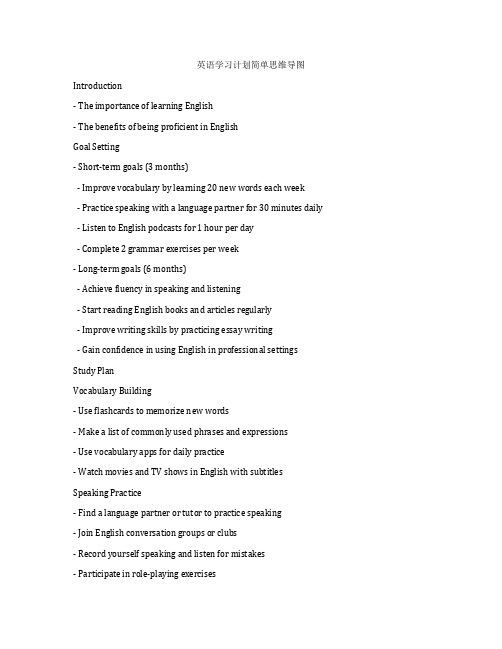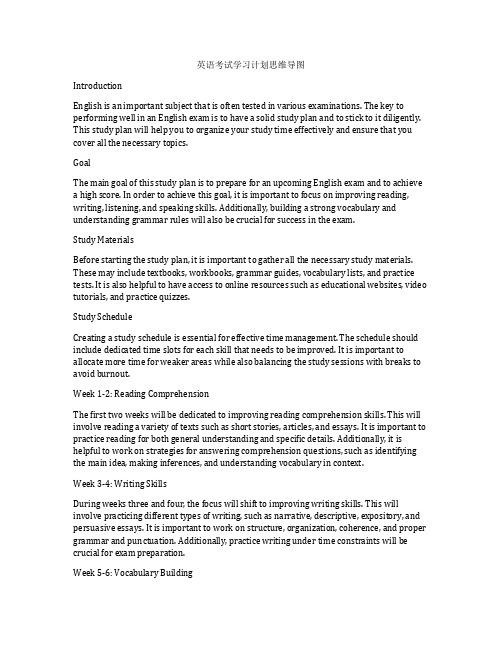【思维导图】英文模板-XON4A5Rq_Project-Plan-脑图
英语启蒙产品市场调研思维导图-英语高清脑图整理-知犀思维导图

英语启蒙产品市场调研家庭环境英语儿歌Fun Fun Kids TVDream English KidsLoo Loo Kdis碰碰狐......英文原版卡通视频英语动画片0-3岁小鸟三号小猪佩奇卡由......3-5岁爱冒险的朵拉天才宝贝熊小兔冰冰托马斯和他的朋友们查理和劳拉动物街64号米奇妙妙屋......5岁以上超级飞侠超级无敌狗掌门汪汪队立大功......学科英文动画片怪物数学小分队(数学)数字地鼠(数学)数字积木(数学)雨果带你看世界(百科&地理)科学小子席德(科学)......英语学习工具点读笔小达人毛毛虫卷之友......熏教机小水牛牛听听......播放器倾听者......课程资源英语线上网课IV"l欧美外教老师哒哒VIP Kidgogokid桥吧贝达......印尼、菲律宾外教51talkabc360说客阿卡索......1V2欧美外教老师鲸鱼久伴兰迪......1V4魔力耳朵久趣哈沃pandaABC......英语线下课英孚瑞思......中大型网课1V多学而思猿辅导新东方跟谁学沪江......AI课小猴英语斑马英语瓜瓜龙英语......英语视频课wonders视频课牛津树视频课兰登视频课......APP/公众号课绘本分级阅读类ABC LearningABC Reading伴鱼绘本......听力磨耳朵类rosette stone大思英语......英语配音类青蛙配音少儿趣配音......词汇积累类适合3-6岁学习Wordplay嘟嘟英语......适合6岁以上学习有道背单词乐词百词斩沪江开心词场扇贝单词墨墨背单词......综合学习类叽里呱啦ABCmousestarfall都都英语多纳学英语成长兔英语蛋糕英语GkidDaDaBaby......。
怪医杜立德思维导图_简单清晰脑图分享-知犀

怪医杜立德基本信息
作者休·洛夫廷
Hugh Lofting,1886—1947
美国童书作家
主要内容讲述了杜立德医生在家乡的离奇生活和在海外的历险经历
荣誉
美国纽伯瑞儿童文学奖金奖获得者成名作
1958年荣获刘易斯·卡罗尔书架奖
继《爱丽丝漫游奇境》之后最杰出的儿童文学经典
主要内容
杜立德本是一位给人看病的医生,但是他非常喜爱动物,满屋子的动物吓跑了所有病人,
杜立德陷入困境
鹦鹉波利尼西亚教会了他鸟兽语,于是,他专门给动物们看起了病,杜立德又能赚钱了
杜立德收留了马戏团的鳄鱼,出于恐惧,人们不敢再送动物给他救治,他又陷入了贫困中
杜立德医生得知非洲的猴子得了一种可怕的传染病,立即出发前往协助
途中遇到了很多危险,杜立德与他的动物们都一一化解。
最终杜立德医生成功救治了猴子
们,并且也回到家乡,开始了幸福的生活
艺术特色
文艺性强作品富有神奇而又合乎情理的幻想,在人物描写上表现得尤为突出
富有知识性在动人的描叙里,在紧张的故事情节里,处处渗透着知识性
具有趣味性巧妙地构思细节, 并且以生动的语言表现出来
内容概述
能和动物交流的杜立德医生,专为动物看病,因此也成为了它们的好朋友。
燕子传来消息说,
非洲的一群猴子们得了重病,希望杜立德医生前去诊治。
自此,杜立德医生和他的动物朋友
们便乘船开启了前往非洲的冒险之旅。
英文学习计划思维导图

英文学习计划思维导图I. IntroductionA. Background- English is a global language and is widely spoken and used for communication in various professional and personal settings.- Acquiring proficiency in English will open up opportunities for career advancement, academic success, and personal growth.B. Purpose- The purpose of this English study plan is to outline a comprehensive approach to learning and improving English language skills, including listening, speaking, reading, and writing. II. Goal SettingA. Short-Term Goals- To improve vocabulary and grammar skills through daily practice and exercises.- To enhance listening and speaking skills by engaging in conversations with native English speakers or through language exchange programs.B. Long-Term Goals- To achieve fluency in English and be able to communicate confidently in professional and social settings.- To be able to write effectively in English, including essays, reports, and creative writing. III. Study MaterialsA. Textbooks and Workbooks- Selecting textbooks and workbooks that cover the essential aspects of English grammar, vocabulary, and writing skills.- Utilizing online resources and digital platforms for interactive learning and practice.B. Online Courses and Tutorials- Enrolling in online courses and tutorials that focus on specific areas of English language learning, such as pronunciation, listening comprehension, and academic writing.C. Reading Materials- Reading a variety of materials in English, including novels, articles, and news publications, to improve reading comprehension and expand vocabulary.IV. Study ScheduleA. Daily Practice- Allocating dedicated time each day for language learning activities, such as vocabulary exercises, grammar drills, and listening comprehension practice.B. Weekly Goals- Setting specific learning objectives for each week, such as mastering a set number of new words, completing a writing assignment, or participating in a spoken English practice session.C. Monthly Progress Review- Assessing progress and identifying areas for improvement on a monthly basis, adjusting the study plan as needed to address weaknesses and build on strengths.V. Language ExchangeA. Finding Language Partners- Seeking out opportunities to engage with native English speakers for conversation practice and language exchange.- Participating in language exchange programs, conversation clubs, and online forums to connect with other English learners.B. Cultural Immersion- Exploring English-speaking cultures through films, music, and literature to gain a deeper understanding of language usage and cultural nuances.VI. Practice and ApplicationA. Speaking Practice- Engaging in regular speaking practice through conversation with peers, language partners, or language exchange groups.- Participating in role-playing exercises, speeches, or presentations to enhance oral communication skills.B. Writing Practice- Writing regularly in English, such as journaling, blogging, or composing essays and articles on various topics.- Seeking feedback from peers, tutors, or online writing communities to improve writing skills.C. Listening Comprehension- Listening to English podcasts, radio programs, and audiobooks to improve listening skills and develop an ear for natural language patterns and intonation.VII. Assessment and FeedbackA. Self-Assessment- Monitoring progress through regular self-assessment of language skills, including vocabulary knowledge, grammar proficiency, and communication fluency.B. Feedback- Seeking feedback from language partners, tutors, or instructors to identify areas for improvement and receive guidance on language learning strategies.C. Language Proficiency Tests- Taking standardized language proficiency tests, such as the TOEFL or IELTS, to evaluate language skills and measure progress.VIII. ConclusionA. Reflection- Reflecting on learning experiences and progress made in acquiring English language skills. - Identifying areas for continued improvement and setting new goals for further language development.B. Continuing Education- Committing to lifelong learning and ongoing language practice to maintain and enhance proficiency in English.- Exploring advanced language learning opportunities, such as academic study abroad programs or professional language certification courses, to further develop language skills.。
英语学习计划简单思维导图

英语学习计划简单思维导图Introduction- The importance of learning English- The benefits of being proficient in EnglishGoal Setting- Short-term goals (3 months)- Improve vocabulary by learning 20 new words each week- Practice speaking with a language partner for 30 minutes daily - Listen to English podcasts for 1 hour per day- Complete 2 grammar exercises per week- Long-term goals (6 months)- Achieve fluency in speaking and listening- Start reading English books and articles regularly- Improve writing skills by practicing essay writing- Gain confidence in using English in professional settings Study PlanVocabulary Building- Use flashcards to memorize new words- Make a list of commonly used phrases and expressions- Use vocabulary apps for daily practice- Watch movies and TV shows in English with subtitles Speaking Practice- Find a language partner or tutor to practice speaking- Join English conversation groups or clubs- Record yourself speaking and listen for mistakes- Participate in role-playing exercisesListening Skills- Listen to English podcasts and news broadcasts- Watch English videos and movies without subtitles- Practice listening to different accents and dialects- Take listening comprehension quizzes and testsGrammar Exercises- Use grammar workbooks and online resources for practice- Complete exercises focusing on specific grammar rules- Review and correct past mistakes in grammar- Seek feedback from a language teacher or tutorReading Comprehension- Start with easy reading materials and gradually move on to more complex texts - Read news articles, short stories, and novels in English- Make notes of new vocabulary and phrases while reading- Summarize and discuss the readings with a language partnerWriting Skills- Practice writing essays, articles, and letters in English- Use writing prompts and exercises to improve creativity and expression- Learn to structure and organize thoughts in written form- Seek feedback and corrections from a teacher or tutorProfessional English- Learn industry-specific vocabulary and phrases- Practice giving professional presentations in English- Participate in English-speaking meetings and discussions at work- Seek out networking opportunities with English-speaking professionals Evaluation and Feedback- Assess progress regularly with language tests and quizzes- Seek feedback from language partners, tutors, and teachers- Reflect on strengths and areas for improvement- Adjust the study plan and goals as needed based on feedback Conclusion- The importance of persistence and dedication in language learning - The benefits of achieving fluency in English- Encouragement to continue practicing and improving language skills References- Online resources for language learning- Books and materials for vocabulary, grammar, and comprehension - Language exchange and conversation groups for practice and support。
英语考试学习计划思维导图

英语考试学习计划思维导图IntroductionEnglish is an important subject that is often tested in various examinations. The key to performing well in an English exam is to have a solid study plan and to stick to it diligently. This study plan will help you to organize your study time effectively and ensure that you cover all the necessary topics.GoalThe main goal of this study plan is to prepare for an upcoming English exam and to achieve a high score. In order to achieve this goal, it is important to focus on improving reading, writing, listening, and speaking skills. Additionally, building a strong vocabulary and understanding grammar rules will also be crucial for success in the exam.Study MaterialsBefore starting the study plan, it is important to gather all the necessary study materials. These may include textbooks, workbooks, grammar guides, vocabulary lists, and practice tests. It is also helpful to have access to online resources such as educational websites, video tutorials, and practice quizzes.Study ScheduleCreating a study schedule is essential for effective time management. The schedule should include dedicated time slots for each skill that needs to be improved. It is important to allocate more time for weaker areas while also balancing the study sessions with breaks to avoid burnout.Week 1-2: Reading ComprehensionThe first two weeks will be dedicated to improving reading comprehension skills. This will involve reading a variety of texts such as short stories, articles, and essays. It is important to practice reading for both general understanding and specific details. Additionally, it is helpful to work on strategies for answering comprehension questions, such as identifying the main idea, making inferences, and understanding vocabulary in context.Week 3-4: Writing SkillsDuring weeks three and four, the focus will shift to improving writing skills. This will involve practicing different types of writing, such as narrative, descriptive, expository, and persuasive essays. It is important to work on structure, organization, coherence, and proper grammar and punctuation. Additionally, practice writing under time constraints will be crucial for exam preparation.Week 5-6: Vocabulary BuildingThe next two weeks will be dedicated to building and expanding vocabulary. This will involve learning new words and their meanings, as well as understanding how to use them in context. It is helpful to utilize flashcards, word games, and mnemonic devices to aid in memorization. Reading extensively and keeping a vocabulary journal can also be effective strategies for vocabulary building.Week 7-8: Grammar and SyntaxWeeks seven and eight will focus on improving grammar and syntax. This will involve reviewing basic grammar rules, such as subject-verb agreement, tenses, and sentence structure. It is important to practice identifying and correcting grammatical errors. Using grammar guides and completing practice exercises will be essential for mastering this skill.Week 9-10: Listening and SpeakingIn the final two weeks, the focus will shift to improving listening and speaking skills. This will involve practicing listening to audio recordings and videos, and then answering comprehension questions. Additionally, it is important to practice speaking by participating in conversations, debates, and presentations. Working on pronunciation and fluency will also be crucial for success in the exam.Practice TestsThroughout the study plan, it is important to regularly take practice tests to assess progress and identify areas that need further improvement. It is helpful to simulate exam conditions by timing the tests and following the same format as the actual exam. Reviewing the results of the practice tests will help to gauge readiness for the exam.ConclusionBy following this study plan, it is possible to effectively prepare for an English exam and achieve a high score. It is important to stay disciplined and dedicated to the study schedule, as consistent and focused practice will lead to success. It is also helpful to seek feedback from teachers or tutors, and to make adjustments to the study plan as needed. With the right approach and effort, it is possible to excel in an English exam and improve overall language skills.。
英语句子的构成思维导图-英语高清脑图整理-知犀思维导图

句子的构成可作主语的词类名词The boy saw the girl.代词He finally saw her.短语动名词短语(表示:已知的事实/曾经做过的事)不定式短语(表示:意愿/目的/未完成的事)名词性从句that从句(句首+that)Whether从句(是由yes/no回答的问句变化而成)疑问词从句(是由疑问词(when,where,what,why,how)问句变化而成以上名词性从句的功能名词短语(疑问词+不定式短语)疑问副词疑问代词表距离的地点副词短语from+地方名词+to+地方名词区分vt.&vi.vt.:代入“我___她”→“她被我___”成eg.love,hate,notice,do,make,enjoy特殊:既是vi.又是vt.eg.sing,run,study特殊:vi.可用作vt.但要以同系名词作宾语dream a terrible dream live a happy life smile a bright smilelaugh a hearty laugh sigh a deep sighsleep a sound sleep主语+完全vt.+宾语完全vt.(需加宾语意思才完全)主语+授予动词+间接宾语+直接宾语授予动词+间接宾语+直接宾语特殊:与of连用表示“提供”的授予动词特殊:explain/introduce/propose/recommend/express+t主语+不完全vt.+宾语+宾语补足语不完全vt.(添加宾语后,需要补语)使役动词知觉动词(注意:此类也可作完全vt.)任命动词认定动词(视...为)转变动词(使...成为...)其它重要的不完全vt.主语+完全vi.完全vi.(不需要宾语意思就完全)主语+不及物动词eg.Something happened主语+be动词+vi.+ing(进行时态eg. Something was happening主语+不完全vi.+表语不完全vi.系动词(无法单独存在,需要加表语)be动词becometurn getseem(似乎)感官动词(译成"...起来")[look,sound,smell,taste,feel]不完全vi.的重要短语fall illfall asleeprun short come to be prove to be其它祈使句感叹句What a great man he is!How great he is!特殊:How great a man he is!How many/much/little/few+复数名词+主语+动词eg.How much money he make问句。
思维导图-英文版

PROCESS
OUTCOME
TASK
MEANING
AUTHENICITY
COMMUNICATIVE
The components of a task:
• 目标 (Goals) • 信息输入( Input Data) 语言信息( Verbal data) 非语言信息(Non-verbal data ) • 活动 (Activities) • 结果 (Outcome) 语言结果( Verbal outcome) 非语言结果(Non-verbal outcome )
Teacher role: Monitor and facilitator
to specify what is regarded as successful completion of the task
Learner role: Conversational partner Setting: Classroom / pair work
Chapter Nine Task-based Language Teaching (Task-based Approach , Task-based Learning, or Task-based Instruction)
Looking back
1.
Definition 2. What is task? 3. Theoretical basis 4. Main features 5. Types of tasks 6. Teaching procedure 7. Learners & Teachers roles 8. Principles 9. Advantages & disadvantages
3.Provision of opportunities for learners to
人教版九年级英语各单元主题思维导图(1-10)

Learning how to learn
单元整体话题篇
Solutions and ways
by asking the teacher for help by doing exercises and reading a lot by explaining the information to another student by listening for just the key words by listening to a tape and repeating out loud by making word cards by reading the textbook by trying many times and learning from mistakes by watching English programs
by working with friends /a group by writing e-mails to pen pals take notes by writing down key words or by drawing mind maps Maybe you should join an English club. Don't read word for word. Read word groups. Be patient. It takes time. Practice makes perfect.
Key verbs
learn, study Improve, practice, repeat review, connect develop, discover, succeed increase, etc.
Challenges
speak too quickly (be)afraid to ask questions make mistakes in grammar can’t understand spoken English can’t get the pronunciation right don't know how to increase my reading speed don't know enough words to write well don't get much writing practice get bored ...
